Law for Licensed Premises: A Comprehensive Overview of Legal Aspects
VerifiedAdded on 2021/02/20
|18
|6086
|26
Report
AI Summary
This report provides a comprehensive overview of the legal aspects surrounding licensed premises. It begins by defining and differentiating between various types of licensed premises, such as free houses, premise licenses, tenancies, personal licenses, and franchises, along with the procedures for license applications. The report then delves into the guidelines for staff conduct, emphasizing the importance of preventing crime, ensuring public safety, and protecting children. It further examines the consequences of providing misleading information to consumers and the employer's liability in protecting consumer interests. Additionally, the report outlines key components of relevant regulations, including weights and measures, food safety, and employment law, along with risk assessment and the impact of food safety and hygiene legislation. Finally, it discusses employer responsibilities in employment and the key aspects of discrimination legislation, providing a complete analysis of the legal requirements for operating licensed premises.
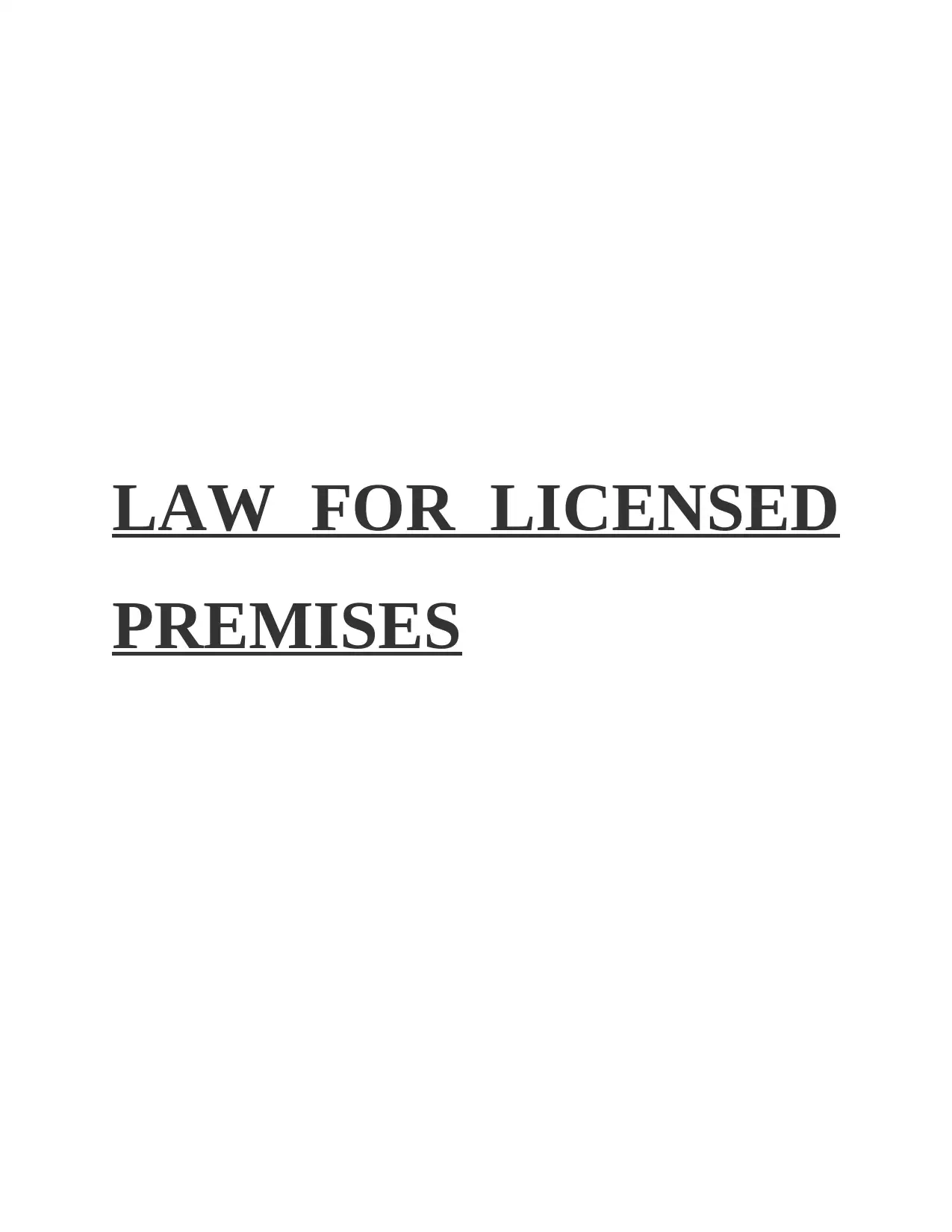
LAW FOR LICENSED
PREMISES
PREMISES
Paraphrase This Document
Need a fresh take? Get an instant paraphrase of this document with our AI Paraphraser
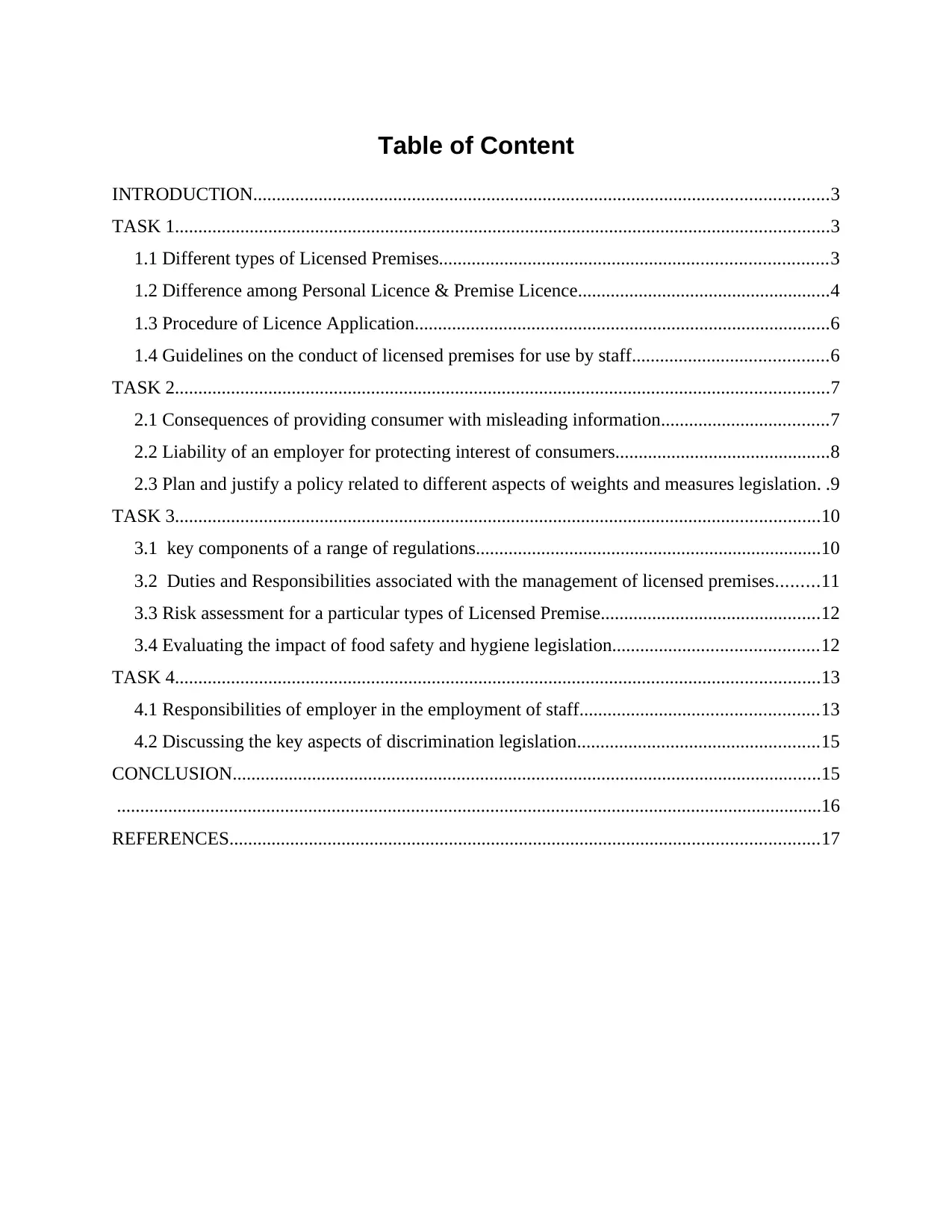
Table of Content
INTRODUCTION...........................................................................................................................3
TASK 1............................................................................................................................................3
1.1 Different types of Licensed Premises...................................................................................3
1.2 Difference among Personal Licence & Premise Licence......................................................4
1.3 Procedure of Licence Application.........................................................................................6
1.4 Guidelines on the conduct of licensed premises for use by staff..........................................6
TASK 2............................................................................................................................................7
2.1 Consequences of providing consumer with misleading information....................................7
2.2 Liability of an employer for protecting interest of consumers..............................................8
2.3 Plan and justify a policy related to different aspects of weights and measures legislation. .9
TASK 3..........................................................................................................................................10
3.1 key components of a range of regulations..........................................................................10
3.2 Duties and Responsibilities associated with the management of licensed premises.........11
3.3 Risk assessment for a particular types of Licensed Premise...............................................12
3.4 Evaluating the impact of food safety and hygiene legislation............................................12
TASK 4..........................................................................................................................................13
4.1 Responsibilities of employer in the employment of staff...................................................13
4.2 Discussing the key aspects of discrimination legislation....................................................15
CONCLUSION..............................................................................................................................15
.......................................................................................................................................................16
REFERENCES..............................................................................................................................17
INTRODUCTION...........................................................................................................................3
TASK 1............................................................................................................................................3
1.1 Different types of Licensed Premises...................................................................................3
1.2 Difference among Personal Licence & Premise Licence......................................................4
1.3 Procedure of Licence Application.........................................................................................6
1.4 Guidelines on the conduct of licensed premises for use by staff..........................................6
TASK 2............................................................................................................................................7
2.1 Consequences of providing consumer with misleading information....................................7
2.2 Liability of an employer for protecting interest of consumers..............................................8
2.3 Plan and justify a policy related to different aspects of weights and measures legislation. .9
TASK 3..........................................................................................................................................10
3.1 key components of a range of regulations..........................................................................10
3.2 Duties and Responsibilities associated with the management of licensed premises.........11
3.3 Risk assessment for a particular types of Licensed Premise...............................................12
3.4 Evaluating the impact of food safety and hygiene legislation............................................12
TASK 4..........................................................................................................................................13
4.1 Responsibilities of employer in the employment of staff...................................................13
4.2 Discussing the key aspects of discrimination legislation....................................................15
CONCLUSION..............................................................................................................................15
.......................................................................................................................................................16
REFERENCES..............................................................................................................................17
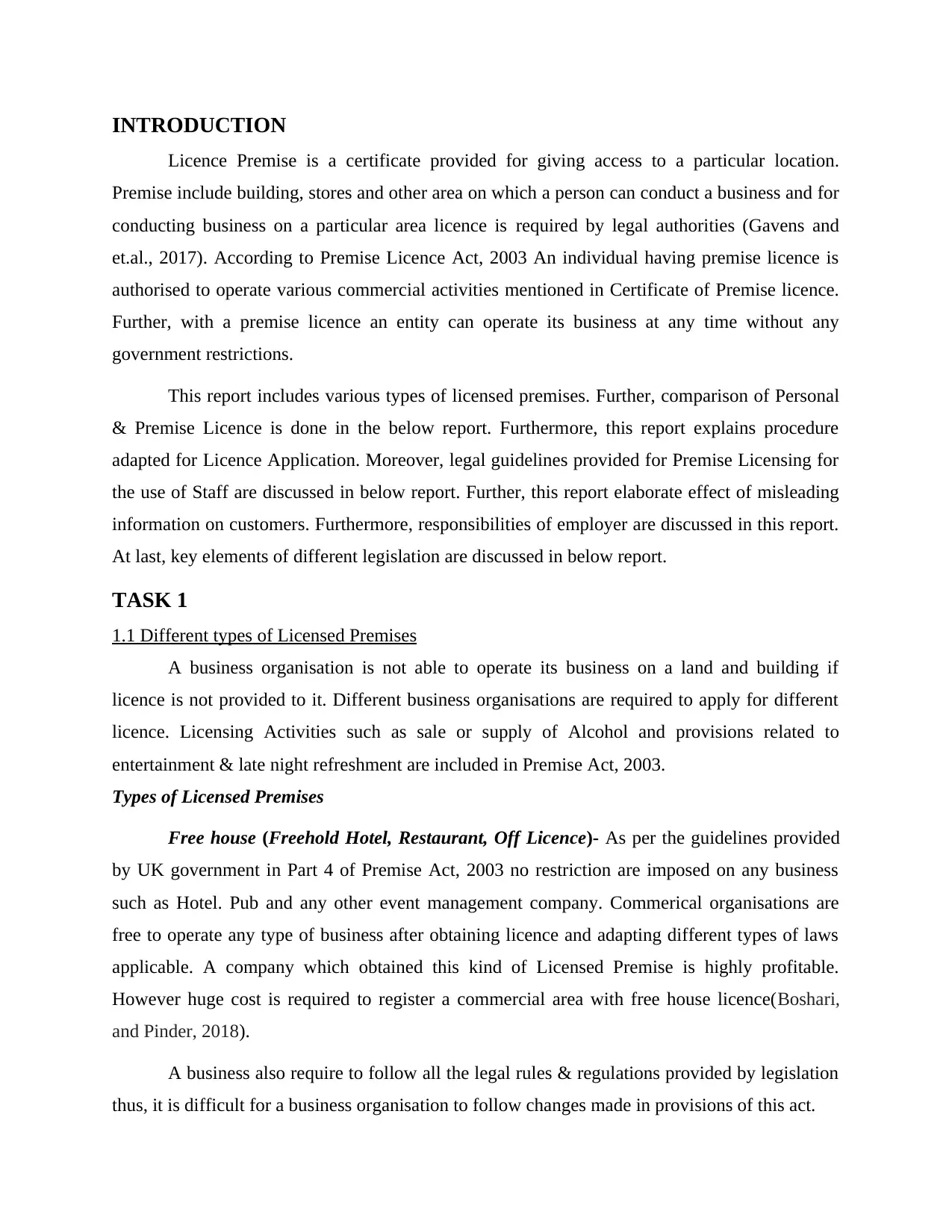
INTRODUCTION
Licence Premise is a certificate provided for giving access to a particular location.
Premise include building, stores and other area on which a person can conduct a business and for
conducting business on a particular area licence is required by legal authorities (Gavens and
et.al., 2017). According to Premise Licence Act, 2003 An individual having premise licence is
authorised to operate various commercial activities mentioned in Certificate of Premise licence.
Further, with a premise licence an entity can operate its business at any time without any
government restrictions.
This report includes various types of licensed premises. Further, comparison of Personal
& Premise Licence is done in the below report. Furthermore, this report explains procedure
adapted for Licence Application. Moreover, legal guidelines provided for Premise Licensing for
the use of Staff are discussed in below report. Further, this report elaborate effect of misleading
information on customers. Furthermore, responsibilities of employer are discussed in this report.
At last, key elements of different legislation are discussed in below report.
TASK 1
1.1 Different types of Licensed Premises
A business organisation is not able to operate its business on a land and building if
licence is not provided to it. Different business organisations are required to apply for different
licence. Licensing Activities such as sale or supply of Alcohol and provisions related to
entertainment & late night refreshment are included in Premise Act, 2003.
Types of Licensed Premises
Free house (Freehold Hotel, Restaurant, Off Licence)- As per the guidelines provided
by UK government in Part 4 of Premise Act, 2003 no restriction are imposed on any business
such as Hotel. Pub and any other event management company. Commerical organisations are
free to operate any type of business after obtaining licence and adapting different types of laws
applicable. A company which obtained this kind of Licensed Premise is highly profitable.
However huge cost is required to register a commercial area with free house licence(Boshari,
and Pinder, 2018).
A business also require to follow all the legal rules & regulations provided by legislation
thus, it is difficult for a business organisation to follow changes made in provisions of this act.
Licence Premise is a certificate provided for giving access to a particular location.
Premise include building, stores and other area on which a person can conduct a business and for
conducting business on a particular area licence is required by legal authorities (Gavens and
et.al., 2017). According to Premise Licence Act, 2003 An individual having premise licence is
authorised to operate various commercial activities mentioned in Certificate of Premise licence.
Further, with a premise licence an entity can operate its business at any time without any
government restrictions.
This report includes various types of licensed premises. Further, comparison of Personal
& Premise Licence is done in the below report. Furthermore, this report explains procedure
adapted for Licence Application. Moreover, legal guidelines provided for Premise Licensing for
the use of Staff are discussed in below report. Further, this report elaborate effect of misleading
information on customers. Furthermore, responsibilities of employer are discussed in this report.
At last, key elements of different legislation are discussed in below report.
TASK 1
1.1 Different types of Licensed Premises
A business organisation is not able to operate its business on a land and building if
licence is not provided to it. Different business organisations are required to apply for different
licence. Licensing Activities such as sale or supply of Alcohol and provisions related to
entertainment & late night refreshment are included in Premise Act, 2003.
Types of Licensed Premises
Free house (Freehold Hotel, Restaurant, Off Licence)- As per the guidelines provided
by UK government in Part 4 of Premise Act, 2003 no restriction are imposed on any business
such as Hotel. Pub and any other event management company. Commerical organisations are
free to operate any type of business after obtaining licence and adapting different types of laws
applicable. A company which obtained this kind of Licensed Premise is highly profitable.
However huge cost is required to register a commercial area with free house licence(Boshari,
and Pinder, 2018).
A business also require to follow all the legal rules & regulations provided by legislation
thus, it is difficult for a business organisation to follow changes made in provisions of this act.
⊘ This is a preview!⊘
Do you want full access?
Subscribe today to unlock all pages.

Trusted by 1+ million students worldwide
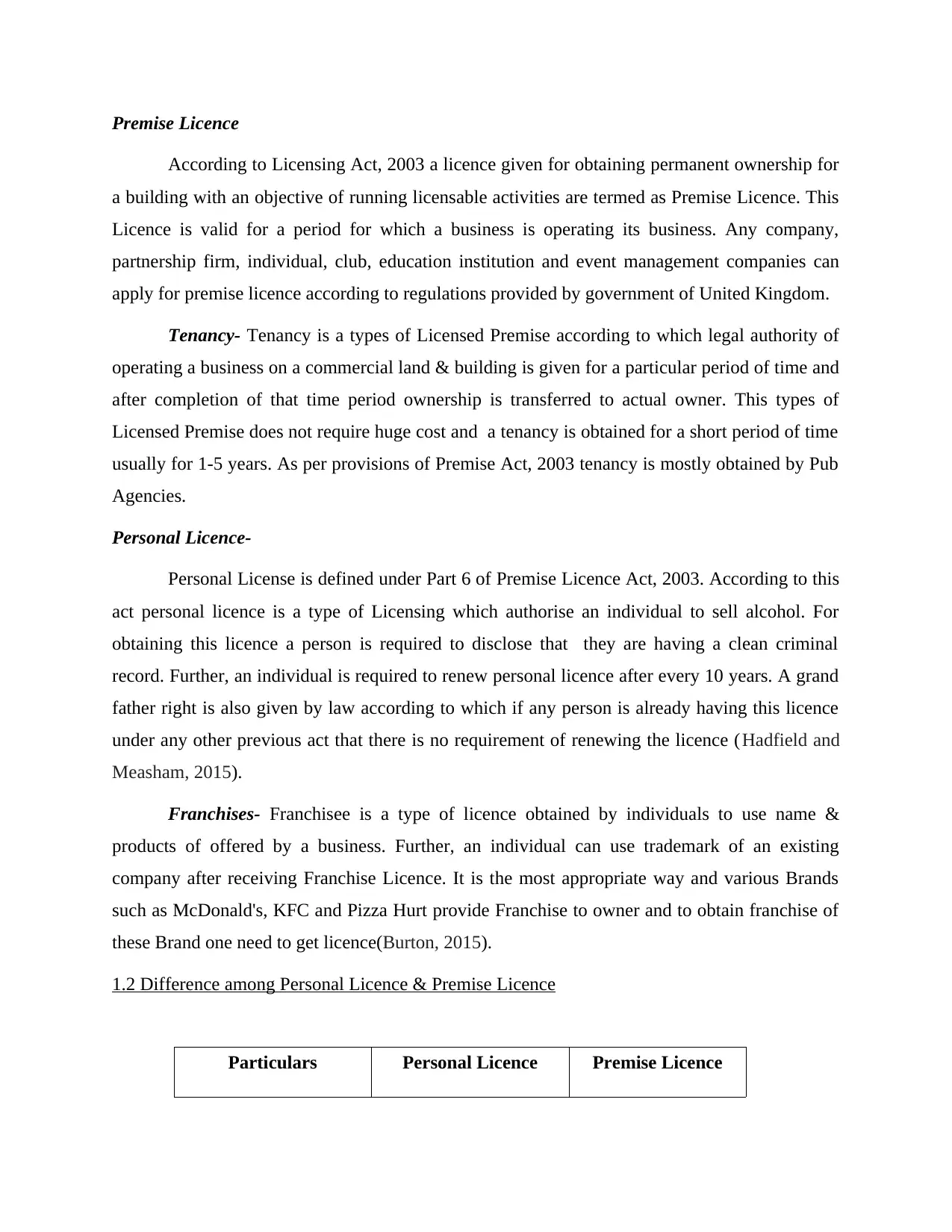
Premise Licence
According to Licensing Act, 2003 a licence given for obtaining permanent ownership for
a building with an objective of running licensable activities are termed as Premise Licence. This
Licence is valid for a period for which a business is operating its business. Any company,
partnership firm, individual, club, education institution and event management companies can
apply for premise licence according to regulations provided by government of United Kingdom.
Tenancy- Tenancy is a types of Licensed Premise according to which legal authority of
operating a business on a commercial land & building is given for a particular period of time and
after completion of that time period ownership is transferred to actual owner. This types of
Licensed Premise does not require huge cost and a tenancy is obtained for a short period of time
usually for 1-5 years. As per provisions of Premise Act, 2003 tenancy is mostly obtained by Pub
Agencies.
Personal Licence-
Personal License is defined under Part 6 of Premise Licence Act, 2003. According to this
act personal licence is a type of Licensing which authorise an individual to sell alcohol. For
obtaining this licence a person is required to disclose that they are having a clean criminal
record. Further, an individual is required to renew personal licence after every 10 years. A grand
father right is also given by law according to which if any person is already having this licence
under any other previous act that there is no requirement of renewing the licence (Hadfield and
Measham, 2015).
Franchises- Franchisee is a type of licence obtained by individuals to use name &
products of offered by a business. Further, an individual can use trademark of an existing
company after receiving Franchise Licence. It is the most appropriate way and various Brands
such as McDonald's, KFC and Pizza Hurt provide Franchise to owner and to obtain franchise of
these Brand one need to get licence(Burton, 2015).
1.2 Difference among Personal Licence & Premise Licence
Particulars Personal Licence Premise Licence
According to Licensing Act, 2003 a licence given for obtaining permanent ownership for
a building with an objective of running licensable activities are termed as Premise Licence. This
Licence is valid for a period for which a business is operating its business. Any company,
partnership firm, individual, club, education institution and event management companies can
apply for premise licence according to regulations provided by government of United Kingdom.
Tenancy- Tenancy is a types of Licensed Premise according to which legal authority of
operating a business on a commercial land & building is given for a particular period of time and
after completion of that time period ownership is transferred to actual owner. This types of
Licensed Premise does not require huge cost and a tenancy is obtained for a short period of time
usually for 1-5 years. As per provisions of Premise Act, 2003 tenancy is mostly obtained by Pub
Agencies.
Personal Licence-
Personal License is defined under Part 6 of Premise Licence Act, 2003. According to this
act personal licence is a type of Licensing which authorise an individual to sell alcohol. For
obtaining this licence a person is required to disclose that they are having a clean criminal
record. Further, an individual is required to renew personal licence after every 10 years. A grand
father right is also given by law according to which if any person is already having this licence
under any other previous act that there is no requirement of renewing the licence (Hadfield and
Measham, 2015).
Franchises- Franchisee is a type of licence obtained by individuals to use name &
products of offered by a business. Further, an individual can use trademark of an existing
company after receiving Franchise Licence. It is the most appropriate way and various Brands
such as McDonald's, KFC and Pizza Hurt provide Franchise to owner and to obtain franchise of
these Brand one need to get licence(Burton, 2015).
1.2 Difference among Personal Licence & Premise Licence
Particulars Personal Licence Premise Licence
Paraphrase This Document
Need a fresh take? Get an instant paraphrase of this document with our AI Paraphraser
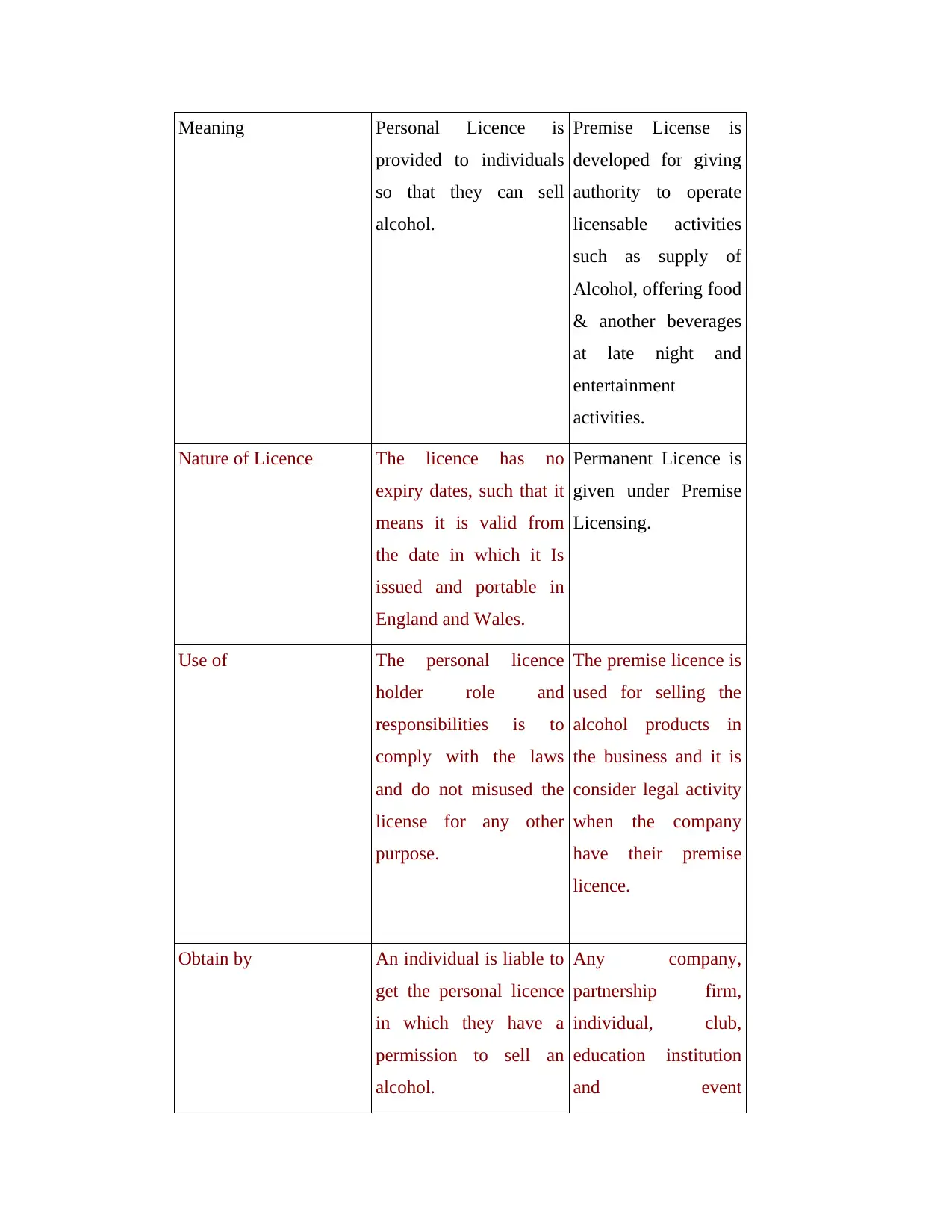
Meaning Personal Licence is
provided to individuals
so that they can sell
alcohol.
Premise License is
developed for giving
authority to operate
licensable activities
such as supply of
Alcohol, offering food
& another beverages
at late night and
entertainment
activities.
Nature of Licence The licence has no
expiry dates, such that it
means it is valid from
the date in which it Is
issued and portable in
England and Wales.
Permanent Licence is
given under Premise
Licensing.
Use of The personal licence
holder role and
responsibilities is to
comply with the laws
and do not misused the
license for any other
purpose.
The premise licence is
used for selling the
alcohol products in
the business and it is
consider legal activity
when the company
have their premise
licence.
Obtain by An individual is liable to
get the personal licence
in which they have a
permission to sell an
alcohol.
Any company,
partnership firm,
individual, club,
education institution
and event
provided to individuals
so that they can sell
alcohol.
Premise License is
developed for giving
authority to operate
licensable activities
such as supply of
Alcohol, offering food
& another beverages
at late night and
entertainment
activities.
Nature of Licence The licence has no
expiry dates, such that it
means it is valid from
the date in which it Is
issued and portable in
England and Wales.
Permanent Licence is
given under Premise
Licensing.
Use of The personal licence
holder role and
responsibilities is to
comply with the laws
and do not misused the
license for any other
purpose.
The premise licence is
used for selling the
alcohol products in
the business and it is
consider legal activity
when the company
have their premise
licence.
Obtain by An individual is liable to
get the personal licence
in which they have a
permission to sell an
alcohol.
Any company,
partnership firm,
individual, club,
education institution
and event
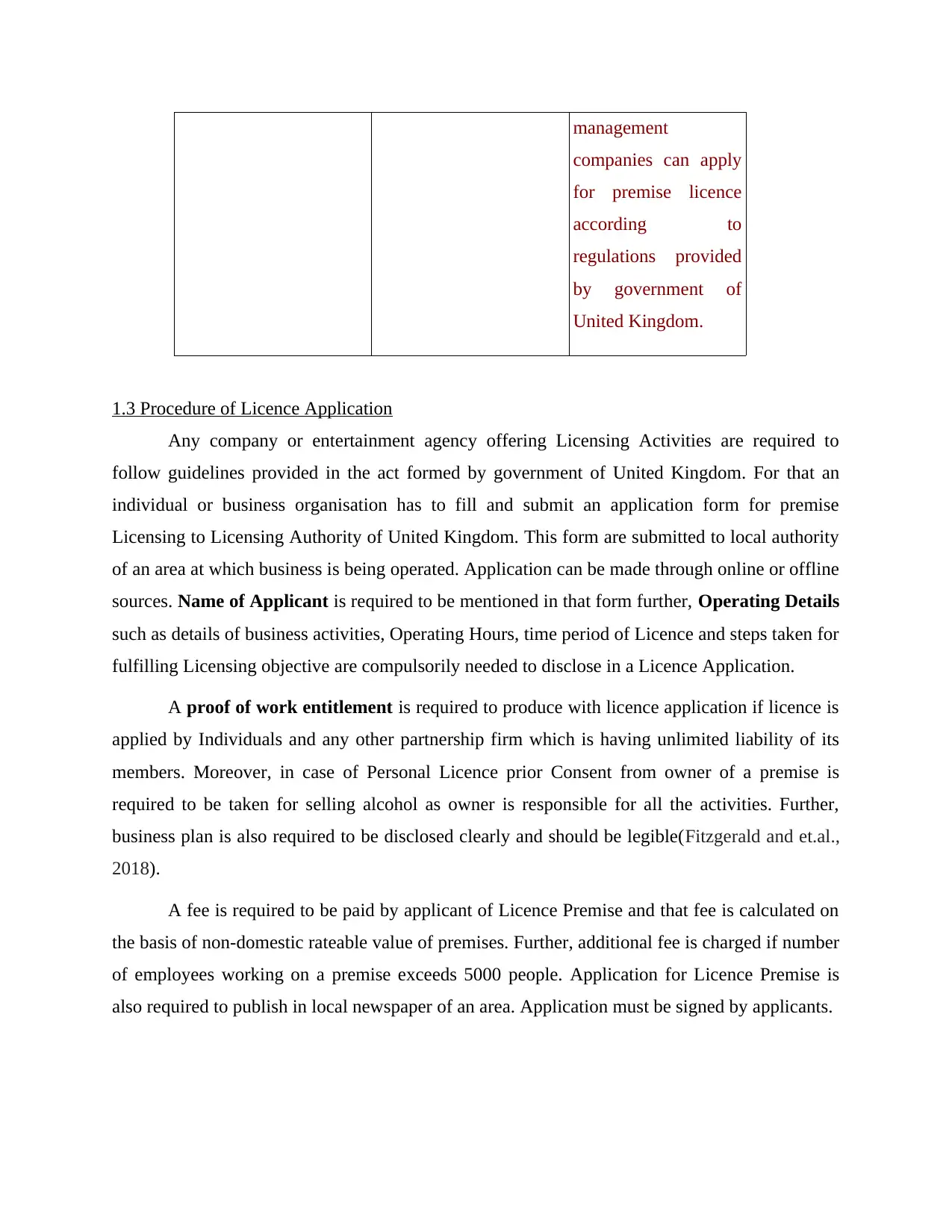
management
companies can apply
for premise licence
according to
regulations provided
by government of
United Kingdom.
1.3 Procedure of Licence Application
Any company or entertainment agency offering Licensing Activities are required to
follow guidelines provided in the act formed by government of United Kingdom. For that an
individual or business organisation has to fill and submit an application form for premise
Licensing to Licensing Authority of United Kingdom. This form are submitted to local authority
of an area at which business is being operated. Application can be made through online or offline
sources. Name of Applicant is required to be mentioned in that form further, Operating Details
such as details of business activities, Operating Hours, time period of Licence and steps taken for
fulfilling Licensing objective are compulsorily needed to disclose in a Licence Application.
A proof of work entitlement is required to produce with licence application if licence is
applied by Individuals and any other partnership firm which is having unlimited liability of its
members. Moreover, in case of Personal Licence prior Consent from owner of a premise is
required to be taken for selling alcohol as owner is responsible for all the activities. Further,
business plan is also required to be disclosed clearly and should be legible(Fitzgerald and et.al.,
2018).
A fee is required to be paid by applicant of Licence Premise and that fee is calculated on
the basis of non-domestic rateable value of premises. Further, additional fee is charged if number
of employees working on a premise exceeds 5000 people. Application for Licence Premise is
also required to publish in local newspaper of an area. Application must be signed by applicants.
companies can apply
for premise licence
according to
regulations provided
by government of
United Kingdom.
1.3 Procedure of Licence Application
Any company or entertainment agency offering Licensing Activities are required to
follow guidelines provided in the act formed by government of United Kingdom. For that an
individual or business organisation has to fill and submit an application form for premise
Licensing to Licensing Authority of United Kingdom. This form are submitted to local authority
of an area at which business is being operated. Application can be made through online or offline
sources. Name of Applicant is required to be mentioned in that form further, Operating Details
such as details of business activities, Operating Hours, time period of Licence and steps taken for
fulfilling Licensing objective are compulsorily needed to disclose in a Licence Application.
A proof of work entitlement is required to produce with licence application if licence is
applied by Individuals and any other partnership firm which is having unlimited liability of its
members. Moreover, in case of Personal Licence prior Consent from owner of a premise is
required to be taken for selling alcohol as owner is responsible for all the activities. Further,
business plan is also required to be disclosed clearly and should be legible(Fitzgerald and et.al.,
2018).
A fee is required to be paid by applicant of Licence Premise and that fee is calculated on
the basis of non-domestic rateable value of premises. Further, additional fee is charged if number
of employees working on a premise exceeds 5000 people. Application for Licence Premise is
also required to publish in local newspaper of an area. Application must be signed by applicants.
⊘ This is a preview!⊘
Do you want full access?
Subscribe today to unlock all pages.

Trusted by 1+ million students worldwide
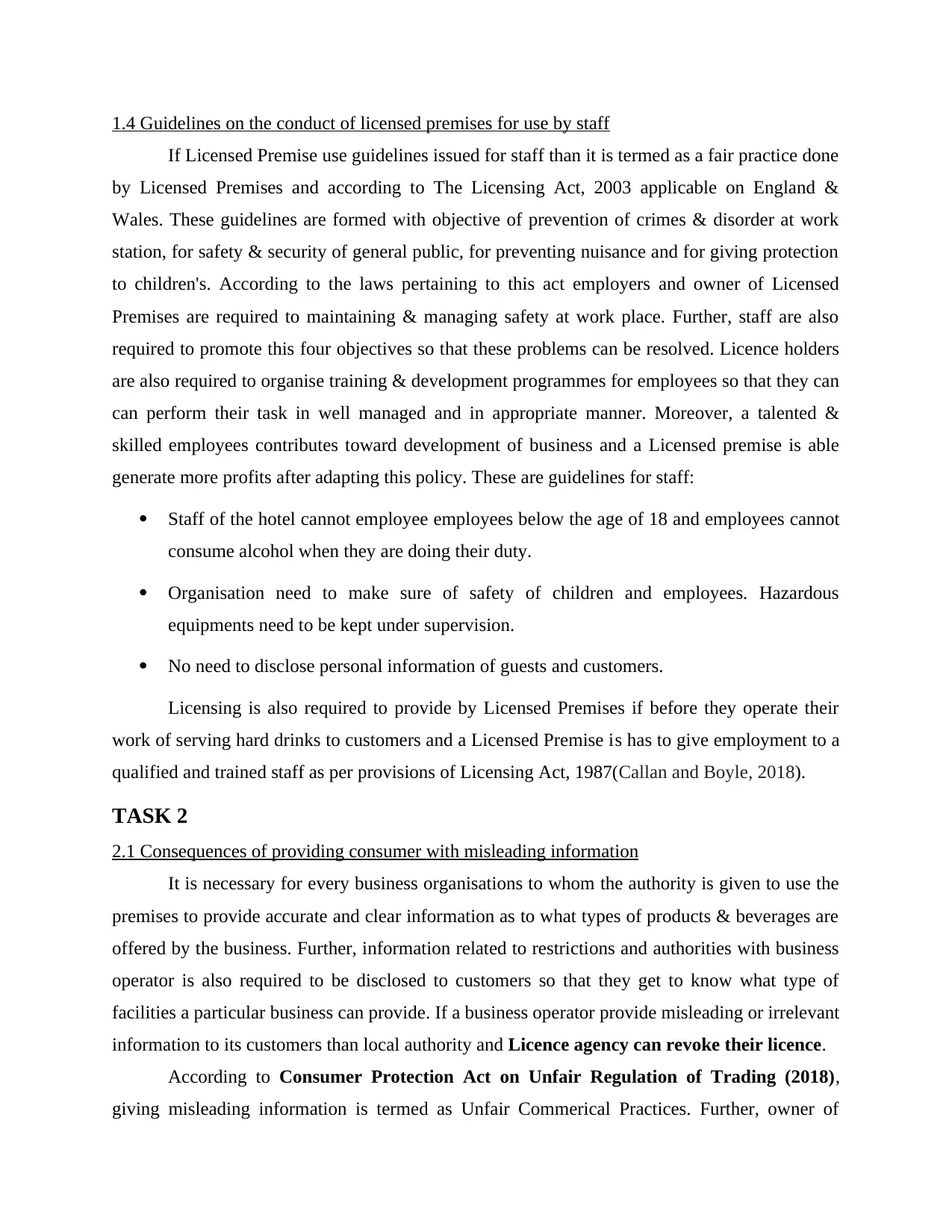
1.4 Guidelines on the conduct of licensed premises for use by staff
If Licensed Premise use guidelines issued for staff than it is termed as a fair practice done
by Licensed Premises and according to The Licensing Act, 2003 applicable on England &
Wales. These guidelines are formed with objective of prevention of crimes & disorder at work
station, for safety & security of general public, for preventing nuisance and for giving protection
to children's. According to the laws pertaining to this act employers and owner of Licensed
Premises are required to maintaining & managing safety at work place. Further, staff are also
required to promote this four objectives so that these problems can be resolved. Licence holders
are also required to organise training & development programmes for employees so that they can
can perform their task in well managed and in appropriate manner. Moreover, a talented &
skilled employees contributes toward development of business and a Licensed premise is able
generate more profits after adapting this policy. These are guidelines for staff:
Staff of the hotel cannot employee employees below the age of 18 and employees cannot
consume alcohol when they are doing their duty.
Organisation need to make sure of safety of children and employees. Hazardous
equipments need to be kept under supervision.
No need to disclose personal information of guests and customers.
Licensing is also required to provide by Licensed Premises if before they operate their
work of serving hard drinks to customers and a Licensed Premise is has to give employment to a
qualified and trained staff as per provisions of Licensing Act, 1987(Callan and Boyle, 2018).
TASK 2
2.1 Consequences of providing consumer with misleading information
It is necessary for every business organisations to whom the authority is given to use the
premises to provide accurate and clear information as to what types of products & beverages are
offered by the business. Further, information related to restrictions and authorities with business
operator is also required to be disclosed to customers so that they get to know what type of
facilities a particular business can provide. If a business operator provide misleading or irrelevant
information to its customers than local authority and Licence agency can revoke their licence.
According to Consumer Protection Act on Unfair Regulation of Trading (2018),
giving misleading information is termed as Unfair Commerical Practices. Further, owner of
If Licensed Premise use guidelines issued for staff than it is termed as a fair practice done
by Licensed Premises and according to The Licensing Act, 2003 applicable on England &
Wales. These guidelines are formed with objective of prevention of crimes & disorder at work
station, for safety & security of general public, for preventing nuisance and for giving protection
to children's. According to the laws pertaining to this act employers and owner of Licensed
Premises are required to maintaining & managing safety at work place. Further, staff are also
required to promote this four objectives so that these problems can be resolved. Licence holders
are also required to organise training & development programmes for employees so that they can
can perform their task in well managed and in appropriate manner. Moreover, a talented &
skilled employees contributes toward development of business and a Licensed premise is able
generate more profits after adapting this policy. These are guidelines for staff:
Staff of the hotel cannot employee employees below the age of 18 and employees cannot
consume alcohol when they are doing their duty.
Organisation need to make sure of safety of children and employees. Hazardous
equipments need to be kept under supervision.
No need to disclose personal information of guests and customers.
Licensing is also required to provide by Licensed Premises if before they operate their
work of serving hard drinks to customers and a Licensed Premise is has to give employment to a
qualified and trained staff as per provisions of Licensing Act, 1987(Callan and Boyle, 2018).
TASK 2
2.1 Consequences of providing consumer with misleading information
It is necessary for every business organisations to whom the authority is given to use the
premises to provide accurate and clear information as to what types of products & beverages are
offered by the business. Further, information related to restrictions and authorities with business
operator is also required to be disclosed to customers so that they get to know what type of
facilities a particular business can provide. If a business operator provide misleading or irrelevant
information to its customers than local authority and Licence agency can revoke their licence.
According to Consumer Protection Act on Unfair Regulation of Trading (2018),
giving misleading information is termed as Unfair Commerical Practices. Further, owner of
Paraphrase This Document
Need a fresh take? Get an instant paraphrase of this document with our AI Paraphraser
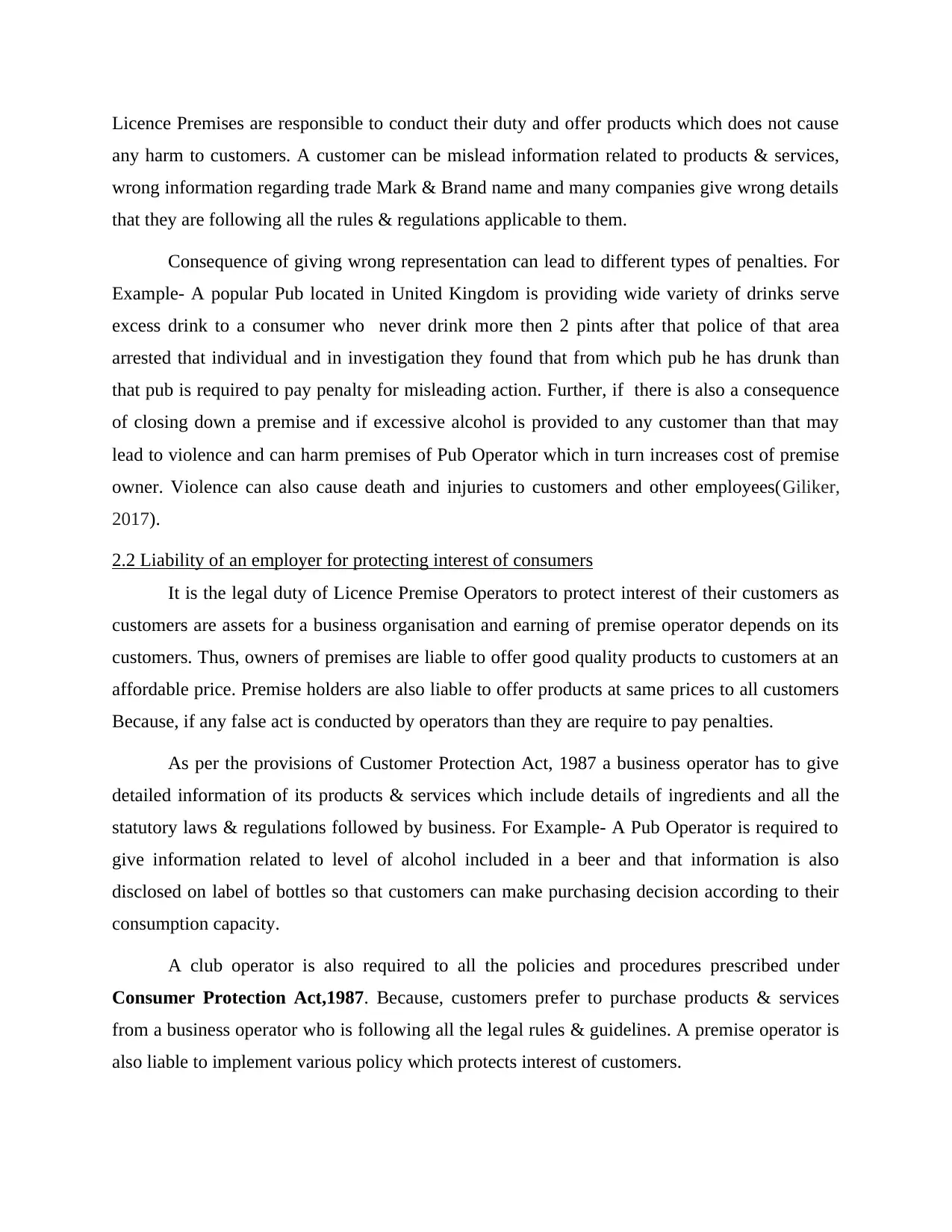
Licence Premises are responsible to conduct their duty and offer products which does not cause
any harm to customers. A customer can be mislead information related to products & services,
wrong information regarding trade Mark & Brand name and many companies give wrong details
that they are following all the rules & regulations applicable to them.
Consequence of giving wrong representation can lead to different types of penalties. For
Example- A popular Pub located in United Kingdom is providing wide variety of drinks serve
excess drink to a consumer who never drink more then 2 pints after that police of that area
arrested that individual and in investigation they found that from which pub he has drunk than
that pub is required to pay penalty for misleading action. Further, if there is also a consequence
of closing down a premise and if excessive alcohol is provided to any customer than that may
lead to violence and can harm premises of Pub Operator which in turn increases cost of premise
owner. Violence can also cause death and injuries to customers and other employees(Giliker,
2017).
2.2 Liability of an employer for protecting interest of consumers
It is the legal duty of Licence Premise Operators to protect interest of their customers as
customers are assets for a business organisation and earning of premise operator depends on its
customers. Thus, owners of premises are liable to offer good quality products to customers at an
affordable price. Premise holders are also liable to offer products at same prices to all customers
Because, if any false act is conducted by operators than they are require to pay penalties.
As per the provisions of Customer Protection Act, 1987 a business operator has to give
detailed information of its products & services which include details of ingredients and all the
statutory laws & regulations followed by business. For Example- A Pub Operator is required to
give information related to level of alcohol included in a beer and that information is also
disclosed on label of bottles so that customers can make purchasing decision according to their
consumption capacity.
A club operator is also required to all the policies and procedures prescribed under
Consumer Protection Act,1987. Because, customers prefer to purchase products & services
from a business operator who is following all the legal rules & guidelines. A premise operator is
also liable to implement various policy which protects interest of customers.
any harm to customers. A customer can be mislead information related to products & services,
wrong information regarding trade Mark & Brand name and many companies give wrong details
that they are following all the rules & regulations applicable to them.
Consequence of giving wrong representation can lead to different types of penalties. For
Example- A popular Pub located in United Kingdom is providing wide variety of drinks serve
excess drink to a consumer who never drink more then 2 pints after that police of that area
arrested that individual and in investigation they found that from which pub he has drunk than
that pub is required to pay penalty for misleading action. Further, if there is also a consequence
of closing down a premise and if excessive alcohol is provided to any customer than that may
lead to violence and can harm premises of Pub Operator which in turn increases cost of premise
owner. Violence can also cause death and injuries to customers and other employees(Giliker,
2017).
2.2 Liability of an employer for protecting interest of consumers
It is the legal duty of Licence Premise Operators to protect interest of their customers as
customers are assets for a business organisation and earning of premise operator depends on its
customers. Thus, owners of premises are liable to offer good quality products to customers at an
affordable price. Premise holders are also liable to offer products at same prices to all customers
Because, if any false act is conducted by operators than they are require to pay penalties.
As per the provisions of Customer Protection Act, 1987 a business operator has to give
detailed information of its products & services which include details of ingredients and all the
statutory laws & regulations followed by business. For Example- A Pub Operator is required to
give information related to level of alcohol included in a beer and that information is also
disclosed on label of bottles so that customers can make purchasing decision according to their
consumption capacity.
A club operator is also required to all the policies and procedures prescribed under
Consumer Protection Act,1987. Because, customers prefer to purchase products & services
from a business operator who is following all the legal rules & guidelines. A premise operator is
also liable to implement various policy which protects interest of customers.
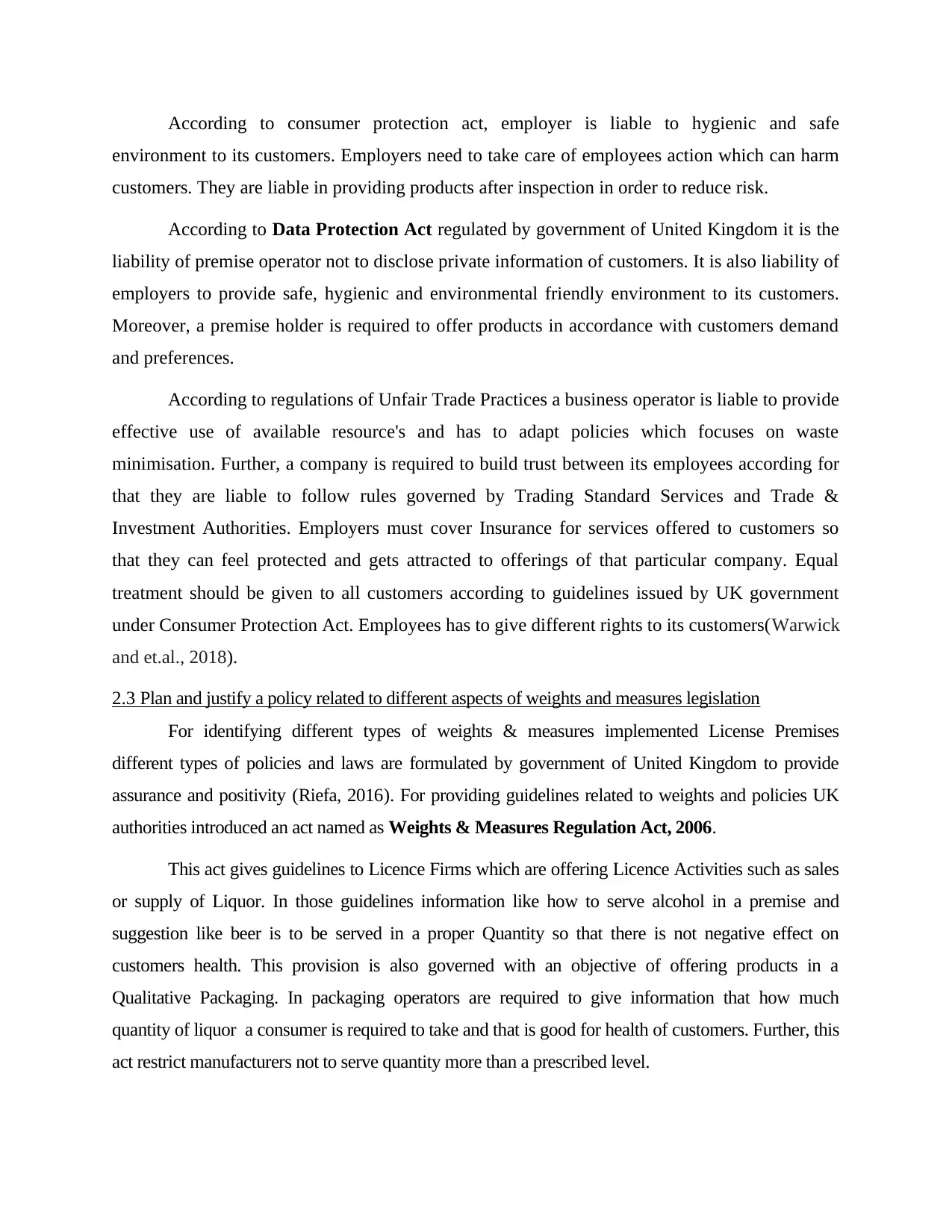
According to consumer protection act, employer is liable to hygienic and safe
environment to its customers. Employers need to take care of employees action which can harm
customers. They are liable in providing products after inspection in order to reduce risk.
According to Data Protection Act regulated by government of United Kingdom it is the
liability of premise operator not to disclose private information of customers. It is also liability of
employers to provide safe, hygienic and environmental friendly environment to its customers.
Moreover, a premise holder is required to offer products in accordance with customers demand
and preferences.
According to regulations of Unfair Trade Practices a business operator is liable to provide
effective use of available resource's and has to adapt policies which focuses on waste
minimisation. Further, a company is required to build trust between its employees according for
that they are liable to follow rules governed by Trading Standard Services and Trade &
Investment Authorities. Employers must cover Insurance for services offered to customers so
that they can feel protected and gets attracted to offerings of that particular company. Equal
treatment should be given to all customers according to guidelines issued by UK government
under Consumer Protection Act. Employees has to give different rights to its customers(Warwick
and et.al., 2018).
2.3 Plan and justify a policy related to different aspects of weights and measures legislation
For identifying different types of weights & measures implemented License Premises
different types of policies and laws are formulated by government of United Kingdom to provide
assurance and positivity (Riefa, 2016). For providing guidelines related to weights and policies UK
authorities introduced an act named as Weights & Measures Regulation Act, 2006.
This act gives guidelines to Licence Firms which are offering Licence Activities such as sales
or supply of Liquor. In those guidelines information like how to serve alcohol in a premise and
suggestion like beer is to be served in a proper Quantity so that there is not negative effect on
customers health. This provision is also governed with an objective of offering products in a
Qualitative Packaging. In packaging operators are required to give information that how much
quantity of liquor a consumer is required to take and that is good for health of customers. Further, this
act restrict manufacturers not to serve quantity more than a prescribed level.
environment to its customers. Employers need to take care of employees action which can harm
customers. They are liable in providing products after inspection in order to reduce risk.
According to Data Protection Act regulated by government of United Kingdom it is the
liability of premise operator not to disclose private information of customers. It is also liability of
employers to provide safe, hygienic and environmental friendly environment to its customers.
Moreover, a premise holder is required to offer products in accordance with customers demand
and preferences.
According to regulations of Unfair Trade Practices a business operator is liable to provide
effective use of available resource's and has to adapt policies which focuses on waste
minimisation. Further, a company is required to build trust between its employees according for
that they are liable to follow rules governed by Trading Standard Services and Trade &
Investment Authorities. Employers must cover Insurance for services offered to customers so
that they can feel protected and gets attracted to offerings of that particular company. Equal
treatment should be given to all customers according to guidelines issued by UK government
under Consumer Protection Act. Employees has to give different rights to its customers(Warwick
and et.al., 2018).
2.3 Plan and justify a policy related to different aspects of weights and measures legislation
For identifying different types of weights & measures implemented License Premises
different types of policies and laws are formulated by government of United Kingdom to provide
assurance and positivity (Riefa, 2016). For providing guidelines related to weights and policies UK
authorities introduced an act named as Weights & Measures Regulation Act, 2006.
This act gives guidelines to Licence Firms which are offering Licence Activities such as sales
or supply of Liquor. In those guidelines information like how to serve alcohol in a premise and
suggestion like beer is to be served in a proper Quantity so that there is not negative effect on
customers health. This provision is also governed with an objective of offering products in a
Qualitative Packaging. In packaging operators are required to give information that how much
quantity of liquor a consumer is required to take and that is good for health of customers. Further, this
act restrict manufacturers not to serve quantity more than a prescribed level.
⊘ This is a preview!⊘
Do you want full access?
Subscribe today to unlock all pages.

Trusted by 1+ million students worldwide
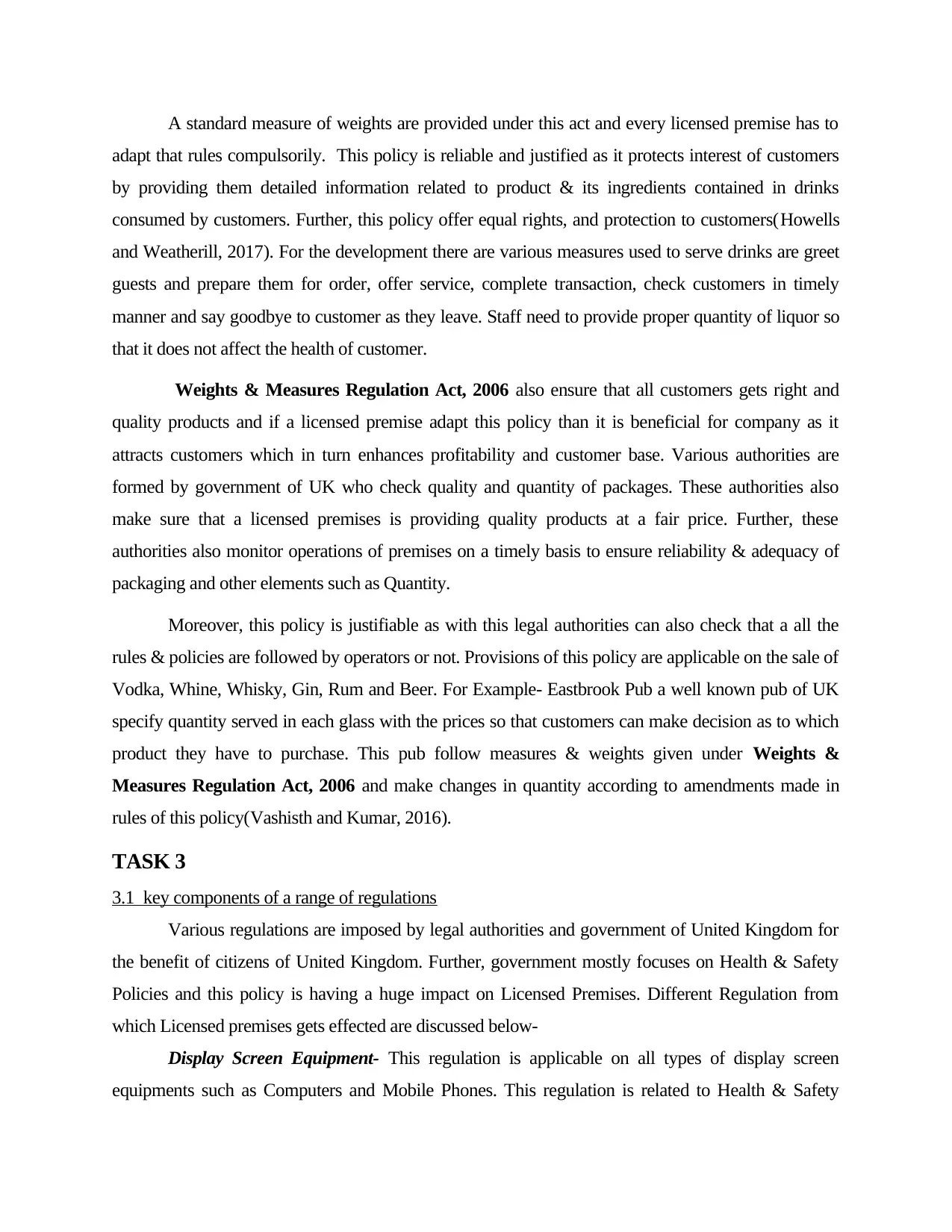
A standard measure of weights are provided under this act and every licensed premise has to
adapt that rules compulsorily. This policy is reliable and justified as it protects interest of customers
by providing them detailed information related to product & its ingredients contained in drinks
consumed by customers. Further, this policy offer equal rights, and protection to customers(Howells
and Weatherill, 2017). For the development there are various measures used to serve drinks are greet
guests and prepare them for order, offer service, complete transaction, check customers in timely
manner and say goodbye to customer as they leave. Staff need to provide proper quantity of liquor so
that it does not affect the health of customer.
Weights & Measures Regulation Act, 2006 also ensure that all customers gets right and
quality products and if a licensed premise adapt this policy than it is beneficial for company as it
attracts customers which in turn enhances profitability and customer base. Various authorities are
formed by government of UK who check quality and quantity of packages. These authorities also
make sure that a licensed premises is providing quality products at a fair price. Further, these
authorities also monitor operations of premises on a timely basis to ensure reliability & adequacy of
packaging and other elements such as Quantity.
Moreover, this policy is justifiable as with this legal authorities can also check that a all the
rules & policies are followed by operators or not. Provisions of this policy are applicable on the sale of
Vodka, Whine, Whisky, Gin, Rum and Beer. For Example- Eastbrook Pub a well known pub of UK
specify quantity served in each glass with the prices so that customers can make decision as to which
product they have to purchase. This pub follow measures & weights given under Weights &
Measures Regulation Act, 2006 and make changes in quantity according to amendments made in
rules of this policy(Vashisth and Kumar, 2016).
TASK 3
3.1 key components of a range of regulations
Various regulations are imposed by legal authorities and government of United Kingdom for
the benefit of citizens of United Kingdom. Further, government mostly focuses on Health & Safety
Policies and this policy is having a huge impact on Licensed Premises. Different Regulation from
which Licensed premises gets effected are discussed below-
Display Screen Equipment- This regulation is applicable on all types of display screen
equipments such as Computers and Mobile Phones. This regulation is related to Health & Safety
adapt that rules compulsorily. This policy is reliable and justified as it protects interest of customers
by providing them detailed information related to product & its ingredients contained in drinks
consumed by customers. Further, this policy offer equal rights, and protection to customers(Howells
and Weatherill, 2017). For the development there are various measures used to serve drinks are greet
guests and prepare them for order, offer service, complete transaction, check customers in timely
manner and say goodbye to customer as they leave. Staff need to provide proper quantity of liquor so
that it does not affect the health of customer.
Weights & Measures Regulation Act, 2006 also ensure that all customers gets right and
quality products and if a licensed premise adapt this policy than it is beneficial for company as it
attracts customers which in turn enhances profitability and customer base. Various authorities are
formed by government of UK who check quality and quantity of packages. These authorities also
make sure that a licensed premises is providing quality products at a fair price. Further, these
authorities also monitor operations of premises on a timely basis to ensure reliability & adequacy of
packaging and other elements such as Quantity.
Moreover, this policy is justifiable as with this legal authorities can also check that a all the
rules & policies are followed by operators or not. Provisions of this policy are applicable on the sale of
Vodka, Whine, Whisky, Gin, Rum and Beer. For Example- Eastbrook Pub a well known pub of UK
specify quantity served in each glass with the prices so that customers can make decision as to which
product they have to purchase. This pub follow measures & weights given under Weights &
Measures Regulation Act, 2006 and make changes in quantity according to amendments made in
rules of this policy(Vashisth and Kumar, 2016).
TASK 3
3.1 key components of a range of regulations
Various regulations are imposed by legal authorities and government of United Kingdom for
the benefit of citizens of United Kingdom. Further, government mostly focuses on Health & Safety
Policies and this policy is having a huge impact on Licensed Premises. Different Regulation from
which Licensed premises gets effected are discussed below-
Display Screen Equipment- This regulation is applicable on all types of display screen
equipments such as Computers and Mobile Phones. This regulation is related to Health & Safety
Paraphrase This Document
Need a fresh take? Get an instant paraphrase of this document with our AI Paraphraser
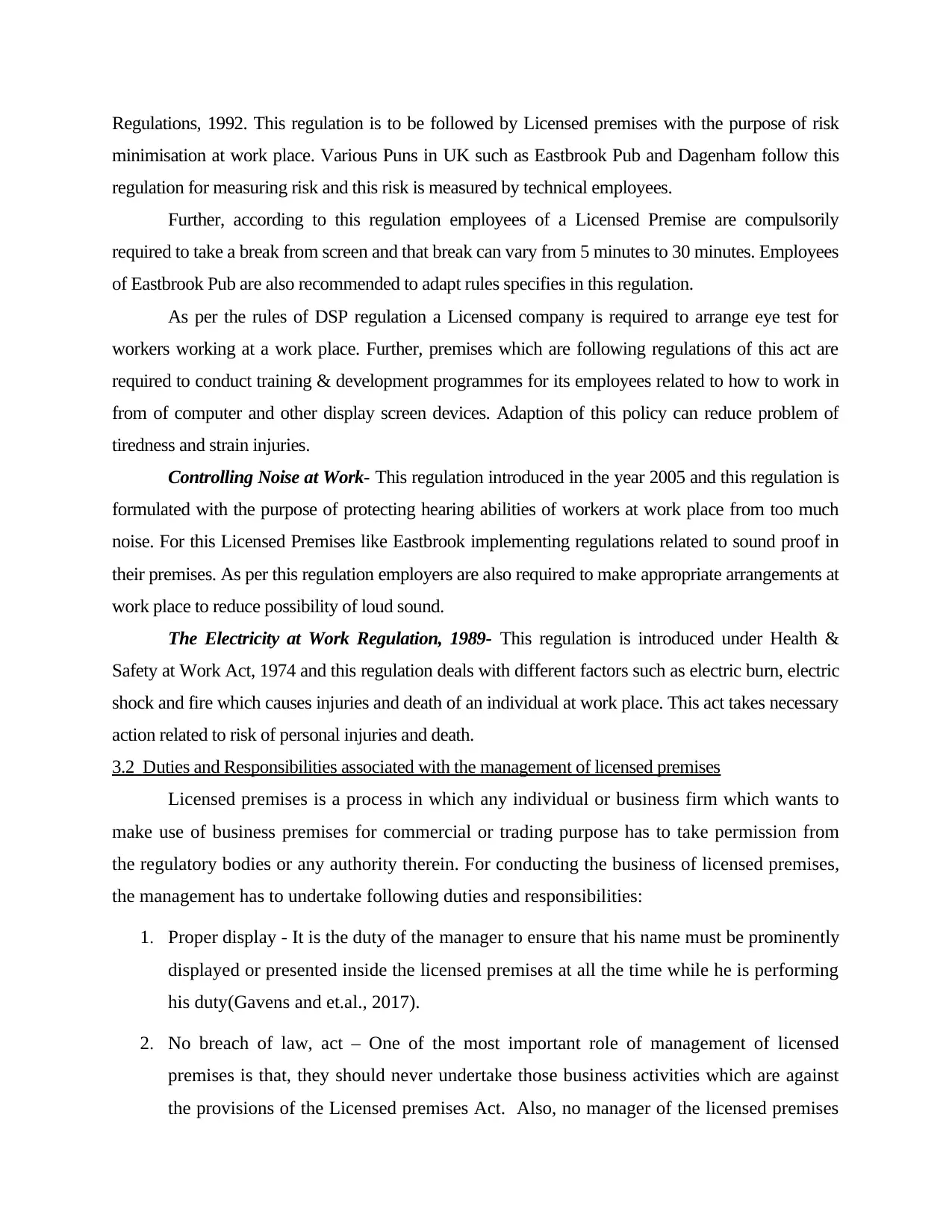
Regulations, 1992. This regulation is to be followed by Licensed premises with the purpose of risk
minimisation at work place. Various Puns in UK such as Eastbrook Pub and Dagenham follow this
regulation for measuring risk and this risk is measured by technical employees.
Further, according to this regulation employees of a Licensed Premise are compulsorily
required to take a break from screen and that break can vary from 5 minutes to 30 minutes. Employees
of Eastbrook Pub are also recommended to adapt rules specifies in this regulation.
As per the rules of DSP regulation a Licensed company is required to arrange eye test for
workers working at a work place. Further, premises which are following regulations of this act are
required to conduct training & development programmes for its employees related to how to work in
from of computer and other display screen devices. Adaption of this policy can reduce problem of
tiredness and strain injuries.
Controlling Noise at Work- This regulation introduced in the year 2005 and this regulation is
formulated with the purpose of protecting hearing abilities of workers at work place from too much
noise. For this Licensed Premises like Eastbrook implementing regulations related to sound proof in
their premises. As per this regulation employers are also required to make appropriate arrangements at
work place to reduce possibility of loud sound.
The Electricity at Work Regulation, 1989- This regulation is introduced under Health &
Safety at Work Act, 1974 and this regulation deals with different factors such as electric burn, electric
shock and fire which causes injuries and death of an individual at work place. This act takes necessary
action related to risk of personal injuries and death.
3.2 Duties and Responsibilities associated with the management of licensed premises
Licensed premises is a process in which any individual or business firm which wants to
make use of business premises for commercial or trading purpose has to take permission from
the regulatory bodies or any authority therein. For conducting the business of licensed premises,
the management has to undertake following duties and responsibilities:
1. Proper display - It is the duty of the manager to ensure that his name must be prominently
displayed or presented inside the licensed premises at all the time while he is performing
his duty(Gavens and et.al., 2017).
2. No breach of law, act – One of the most important role of management of licensed
premises is that, they should never undertake those business activities which are against
the provisions of the Licensed premises Act. Also, no manager of the licensed premises
minimisation at work place. Various Puns in UK such as Eastbrook Pub and Dagenham follow this
regulation for measuring risk and this risk is measured by technical employees.
Further, according to this regulation employees of a Licensed Premise are compulsorily
required to take a break from screen and that break can vary from 5 minutes to 30 minutes. Employees
of Eastbrook Pub are also recommended to adapt rules specifies in this regulation.
As per the rules of DSP regulation a Licensed company is required to arrange eye test for
workers working at a work place. Further, premises which are following regulations of this act are
required to conduct training & development programmes for its employees related to how to work in
from of computer and other display screen devices. Adaption of this policy can reduce problem of
tiredness and strain injuries.
Controlling Noise at Work- This regulation introduced in the year 2005 and this regulation is
formulated with the purpose of protecting hearing abilities of workers at work place from too much
noise. For this Licensed Premises like Eastbrook implementing regulations related to sound proof in
their premises. As per this regulation employers are also required to make appropriate arrangements at
work place to reduce possibility of loud sound.
The Electricity at Work Regulation, 1989- This regulation is introduced under Health &
Safety at Work Act, 1974 and this regulation deals with different factors such as electric burn, electric
shock and fire which causes injuries and death of an individual at work place. This act takes necessary
action related to risk of personal injuries and death.
3.2 Duties and Responsibilities associated with the management of licensed premises
Licensed premises is a process in which any individual or business firm which wants to
make use of business premises for commercial or trading purpose has to take permission from
the regulatory bodies or any authority therein. For conducting the business of licensed premises,
the management has to undertake following duties and responsibilities:
1. Proper display - It is the duty of the manager to ensure that his name must be prominently
displayed or presented inside the licensed premises at all the time while he is performing
his duty(Gavens and et.al., 2017).
2. No breach of law, act – One of the most important role of management of licensed
premises is that, they should never undertake those business activities which are against
the provisions of the Licensed premises Act. Also, no manager of the licensed premises
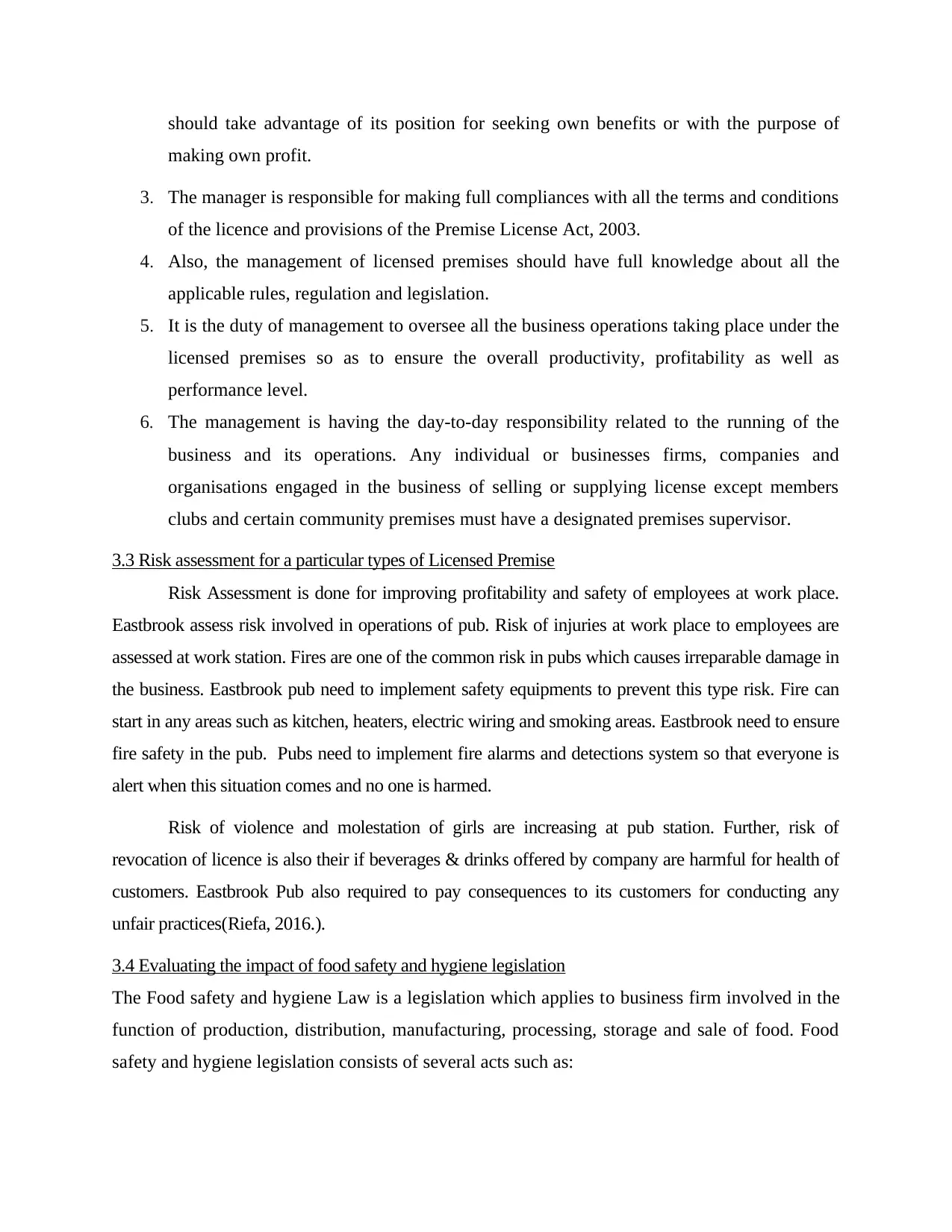
should take advantage of its position for seeking own benefits or with the purpose of
making own profit.
3. The manager is responsible for making full compliances with all the terms and conditions
of the licence and provisions of the Premise License Act, 2003.
4. Also, the management of licensed premises should have full knowledge about all the
applicable rules, regulation and legislation.
5. It is the duty of management to oversee all the business operations taking place under the
licensed premises so as to ensure the overall productivity, profitability as well as
performance level.
6. The management is having the day-to-day responsibility related to the running of the
business and its operations. Any individual or businesses firms, companies and
organisations engaged in the business of selling or supplying license except members
clubs and certain community premises must have a designated premises supervisor.
3.3 Risk assessment for a particular types of Licensed Premise
Risk Assessment is done for improving profitability and safety of employees at work place.
Eastbrook assess risk involved in operations of pub. Risk of injuries at work place to employees are
assessed at work station. Fires are one of the common risk in pubs which causes irreparable damage in
the business. Eastbrook pub need to implement safety equipments to prevent this type risk. Fire can
start in any areas such as kitchen, heaters, electric wiring and smoking areas. Eastbrook need to ensure
fire safety in the pub. Pubs need to implement fire alarms and detections system so that everyone is
alert when this situation comes and no one is harmed.
Risk of violence and molestation of girls are increasing at pub station. Further, risk of
revocation of licence is also their if beverages & drinks offered by company are harmful for health of
customers. Eastbrook Pub also required to pay consequences to its customers for conducting any
unfair practices(Riefa, 2016.).
3.4 Evaluating the impact of food safety and hygiene legislation
The Food safety and hygiene Law is a legislation which applies to business firm involved in the
function of production, distribution, manufacturing, processing, storage and sale of food. Food
safety and hygiene legislation consists of several acts such as:
making own profit.
3. The manager is responsible for making full compliances with all the terms and conditions
of the licence and provisions of the Premise License Act, 2003.
4. Also, the management of licensed premises should have full knowledge about all the
applicable rules, regulation and legislation.
5. It is the duty of management to oversee all the business operations taking place under the
licensed premises so as to ensure the overall productivity, profitability as well as
performance level.
6. The management is having the day-to-day responsibility related to the running of the
business and its operations. Any individual or businesses firms, companies and
organisations engaged in the business of selling or supplying license except members
clubs and certain community premises must have a designated premises supervisor.
3.3 Risk assessment for a particular types of Licensed Premise
Risk Assessment is done for improving profitability and safety of employees at work place.
Eastbrook assess risk involved in operations of pub. Risk of injuries at work place to employees are
assessed at work station. Fires are one of the common risk in pubs which causes irreparable damage in
the business. Eastbrook pub need to implement safety equipments to prevent this type risk. Fire can
start in any areas such as kitchen, heaters, electric wiring and smoking areas. Eastbrook need to ensure
fire safety in the pub. Pubs need to implement fire alarms and detections system so that everyone is
alert when this situation comes and no one is harmed.
Risk of violence and molestation of girls are increasing at pub station. Further, risk of
revocation of licence is also their if beverages & drinks offered by company are harmful for health of
customers. Eastbrook Pub also required to pay consequences to its customers for conducting any
unfair practices(Riefa, 2016.).
3.4 Evaluating the impact of food safety and hygiene legislation
The Food safety and hygiene Law is a legislation which applies to business firm involved in the
function of production, distribution, manufacturing, processing, storage and sale of food. Food
safety and hygiene legislation consists of several acts such as:
⊘ This is a preview!⊘
Do you want full access?
Subscribe today to unlock all pages.

Trusted by 1+ million students worldwide
1 out of 18
Related Documents
Your All-in-One AI-Powered Toolkit for Academic Success.
+13062052269
info@desklib.com
Available 24*7 on WhatsApp / Email
![[object Object]](/_next/static/media/star-bottom.7253800d.svg)
Unlock your academic potential
Copyright © 2020–2026 A2Z Services. All Rights Reserved. Developed and managed by ZUCOL.





